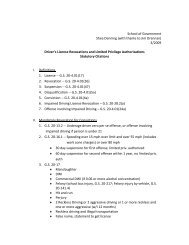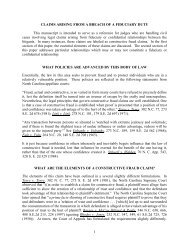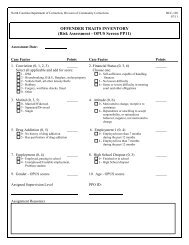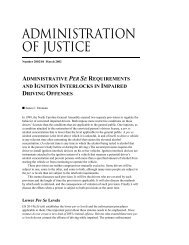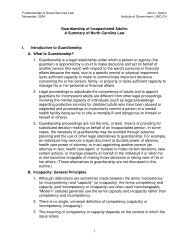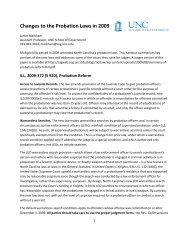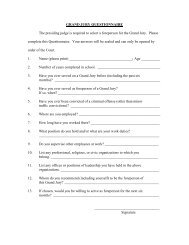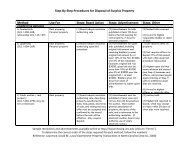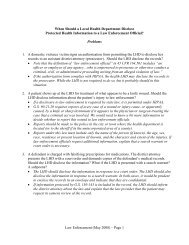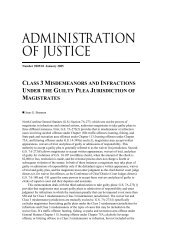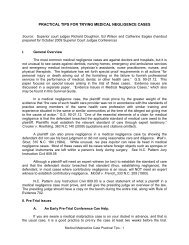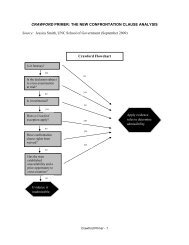Handout 1 - School of Government - University of North Carolina at ...
Handout 1 - School of Government - University of North Carolina at ...
Handout 1 - School of Government - University of North Carolina at ...
Create successful ePaper yourself
Turn your PDF publications into a flip-book with our unique Google optimized e-Paper software.
settlement or other recovery by the recipient. In this case, because DMA’s claim was for less than one<br />
third <strong>of</strong> the settlement amount, the court ordered full reimbursement.<br />
The trustee <strong>of</strong> the settlement appealed and the court <strong>of</strong> appeals affirmed. In Arkansas DHS v.<br />
Ahlborn, 547 U.S. 268 (2006), the U.S. Supreme Court held th<strong>at</strong> the st<strong>at</strong>e could not recover an amount<br />
higher than the portion <strong>of</strong> the settlement th<strong>at</strong> represented medical expenses, in a case in which the parties<br />
had stipul<strong>at</strong>ed to wh<strong>at</strong> th<strong>at</strong> portion was. In Andrews, the trustee argued th<strong>at</strong> when a settlement does not<br />
specify the amount th<strong>at</strong> represents medical expenses, the court must conduct a hearing to determine wh<strong>at</strong><br />
portion <strong>of</strong> the settlement amount th<strong>at</strong> is.<br />
Held: Affirmed.<br />
Affirming the court <strong>of</strong> appeals, which had affirmed the trial court, the N.C. Supreme Court held th<strong>at</strong><br />
1. Ahlborn “did not require a specific method for determining the portion <strong>of</strong> a settlement th<strong>at</strong> represents<br />
the recovery <strong>of</strong> medical expenses.”<br />
2. N.C. law provides th<strong>at</strong> the portion <strong>of</strong> a settlement th<strong>at</strong> represents payment for medical expenses, when<br />
th<strong>at</strong> is not specified, is “the lesser <strong>of</strong> the St<strong>at</strong>e’s past medical expenditures or one-third <strong>of</strong> the<br />
plaintiff’s total recovery.”<br />
3. <strong>North</strong> <strong>Carolina</strong>’s approach is reasonable and consistent with the holding in Ahlborn.<br />
Medicaid Appeals<br />
Meza v. DHHS, ___ N.C. App. ___, 668 S.E.2d 571 (10/21/08).<br />
http://www.aoc.st<strong>at</strong>e.nc.us/www/public/coa/opinions/2008/070407-1.htm<br />
Facts: The appellant had sought judicial review <strong>of</strong> a final DHHS determin<strong>at</strong>ion th<strong>at</strong> only the first days <strong>of</strong><br />
two hospital stays qualified as tre<strong>at</strong>ment for medical emergencies and th<strong>at</strong> because she was an unqualified<br />
alien, she was not eligible for Medicaid for the additional days in the hospital. The superior court<br />
considered the evidence, made findings <strong>of</strong> fact and conclusions <strong>of</strong> law, reversed the administr<strong>at</strong>ive<br />
decision, and ordered DHHS to provide appellant with Medicaid coverage for the full length <strong>of</strong> both<br />
hospital stays.<br />
Held: Affirmed.<br />
The court <strong>of</strong> appeals considered only whether the superior court had applied the correct standard <strong>of</strong> review<br />
and affirmed, relying in part on G.S. 108A-79(k), which says th<strong>at</strong> the superior court properly may take<br />
testimony and “examine into the facts <strong>of</strong> the case, to determine whether the final decision is in error under<br />
federal and St<strong>at</strong>e law, and under [applicable] rules and regul<strong>at</strong>ions . . . .” The court declined to consider<br />
the merits because error was not assigned to any <strong>of</strong> the superior court's findings or conclusions<br />
Dissent: Judge Steelman dissented on the basis th<strong>at</strong> the superior court should have applied the “whole<br />
record” test when reviewing the administr<strong>at</strong>ive decision.<br />
Martin v. <strong>North</strong> <strong>Carolina</strong> Dept. <strong>of</strong> Health and Human Services, ___ N.C. App. ___, 670 S.E.2d 629<br />
(1/6/09).<br />
http://www.aoc.st<strong>at</strong>e.nc.us/www/public/coa/opinions/2009/080259-1.htm<br />
Facts: The superior court reversed the DHHS final agency decision (which upheld the county DSS<br />
decision) termin<strong>at</strong>ing petitioner’s Medicaid for Qualified Beneficiary Part B (MQB-B), an eligibility<br />
c<strong>at</strong>egory for those who need help paying their Medicare Part B premiums. The agency decision was based<br />
on st<strong>at</strong>e guidance th<strong>at</strong> because petitioner’s husband was not eligible for Medicare, petitioner’s income<br />
should be evalu<strong>at</strong>ed in rel<strong>at</strong>ion to her as an individual, not in rel<strong>at</strong>ion to a family <strong>of</strong> two.<br />
Held: Affirmed.<br />
The court <strong>of</strong> appeals affirmed the superior court’s reversal, finding th<strong>at</strong> the st<strong>at</strong>e’s interpret<strong>at</strong>ion was<br />
contrary to the plain language <strong>of</strong> the federal st<strong>at</strong>ute and, the court noted, contrary to the st<strong>at</strong>e’s final<br />
decision in a previous similar case.<br />
18



